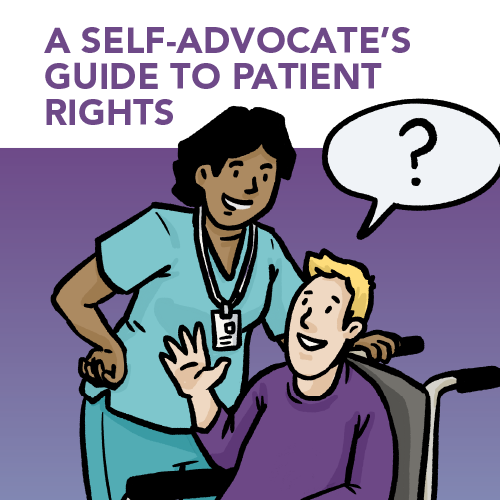A Self-Advocate’s Guide To Patient Rights
Last Revised: May 2025
Transcript:
A Self Advocate’s Guide to Patient Rights
Created by the Vermont Developmental Disabilities Council.
What is this guide for?
This guide is to help you be in control during visits with your healthcare provider. You have the power to advocate for yourself.
What is the Americans with Disabilities Act (ADA)?
The Americans with Disabilities Act (ADA) is a law that says that people with disabilities cannot be treated unfairly. It also says that we all have the right to enter and use public spaces.
Your Basic Rights and What They Mean:
The Right to Be Treated With Respect
You should be listened to.
Treated kindly.
Have your values and ideas respected.
Your privacy should be protected.
The Right to a Support Person at Appointments
You have the right to go alone or bring a support person with you to health visits. A support person can be a friend, family member, or support staff. They can help with notes or questions. They can be a second set of ears for you.
They can take notes and help ask questions.
They can be a second set of ears for you.
The Right to Informed Consent
You have the right to understand your health.
You can ask questions.
You can make choices that are right for you.
The Right to Get Your Medical Records
You can request a copy of your health info.
Patient portals can help you access records online.
You can ask your provider for help using them.
The Right to Privacy of Your Medical Records
Only people you choose can see your health info.
It’s your right to keep it private.
The Right to Make Choices About Your Care
You can ask about side effects.
You have the right to say yes or no to medication or procedures.
Even if it could save your life, it’s your choice.
The Right to Make Decisions About End-of-Life Care
You can choose what care you want at the end of life.
You can create an advance directive.
You have the right to hospice care to stay comfortable.
Use These Pages for Your Next Appointment
Space to write your provider’s name, number, address.
A section for your questions and notes.
What is The Inclusive Healthcare Partnership Project (IHPP)?
IHPP helps people understand their health and supports healthcare providers in working well with neurodiverse patients.
IHPP Goals:
Create plain language health information.
Train healthcare providers to communicate better.
Last revised: January 2025
More info: http://www.ihppvt.org
Supported by the Administration for Community Living (ACL), U.S. Department of Health and Human Services (HHS). Award: $95,319.
IHPP guides are for educational purposes only. The illustrations and information about anatomy are for learning about the human body, health conditions, and preparing for appointments. These guides should not be used to diagnose or treat any health problems. These guides are not a replacement for seeing a licensed medical professional. Please talk with your healthcare provider if you have questions or concerns about your health.
Sources:
American Medical Association. (2025). Patient Rights in AMA Code of Medical Ethics (Opinion 1.1.3). https://code-medical-ethics.ama-assn.org/ethics-opinions/patient-rights
Legal Services Vermont and Vermont Legal Aid. (2017). How to get your medical records. https://vtlawhelp.org/how-get-your-medical-records
Self Advocacy Resource and Technical Assistance Center (SARTAC). (2025) How to talk with your doctor. (February 2025). https://selfadvocacyinfo.org/wp-content/uploads/2025/02/SARTAC-Talking-to-your-Doctor.pdf

